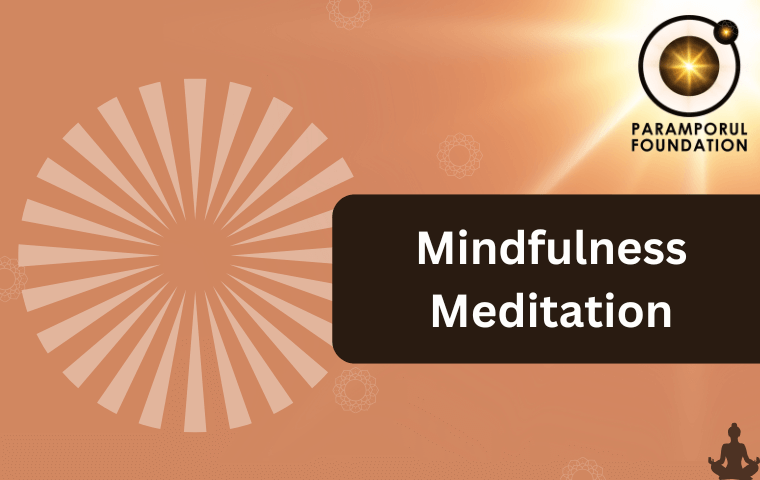Mindfulness meditation helps individuals stay in the present moment, calmly observe their thoughts and emotions without judgment, and achieve inner peace. This approach blends the principles of mindfulness awareness of what’s happening right now with meditation, which focuses on steadying the mind. Consistently practicing mindfulness meditation can alleviate stress, sharpen mental focus, and enhance overall health.
What is Mindfulness Meditation?
At its core, mindfulness meditation trains us to pay attention to our thoughts, feelings, and body sensations in a calm and accepting way. By focusing on the present, we learn to let go of worries about the past or the future. This practice involves two key elements:
- Awareness – Focusing on what is happening at the moment, like noticing how we breathe or the sensations in our body.
- Acceptance – Observing our thoughts and emotions without reacting or judging them.
This kind of meditation is versatile, and it can be done almost anywhere, whether sitting quietly at home, waiting in line, or walking in nature.
How to Practice Mindfulness Meditation
Starting mindfulness meditation can be easy and doesn’t require any special equipment. Follow these simple steps to get started:

- Find a Comfortable Position: Sit in a relaxed posture, either on a chair or on the floor. Keep your back straight but not stiff, with your hands resting comfortably on your lap.
- Focus on Your Breathing: Close your eyes if you prefer, and take a few deep breaths. Notice how the air feels as it moves in and out of your body. Feel your chest rise and fall or the coolness of the air as it enters your nostrils.
- Notice Your Thoughts: As you focus on your breathing, you’ll likely notice thoughts coming and going. Rather than pushing them away, acknowledge them and let them pass like clouds drifting in the sky. When your mind wanders, gently return to your breathing.
- Observe Sensations and Feelings: You may also notice physical sensations or emotions during your practice. Whether it’s tension in your shoulders or a feeling of calm, simply observe it without judging.
- Repeat and Gradually Extend Your Practice: Start with a short session, maybe five minutes, and gradually increase the time as you feel comfortable.
Benefits of Mindfulness Meditation
Practicing mindfulness meditation has positive effects on both mental and physical health. Some of the most notable benefits include:

- Reducing Stress: This meditation has been shown to reduce stress by helping people stay calm and focused, even in challenging situations.
- Improving Heart Health: Studies indicate that mindfulness can lower heart rate and improve cardiovascular health.
- Strengthening Immunity: This form of meditation may strengthen the immune system, aiding the body in fighting off illness.
- Enhancing Sleep: Regular mindfulness practice has been linked to better sleep quality, helping to ease sleep issues over time.
- Altering the Brain: Long-term practice of this meditation can change brain structures related to attention, emotion regulation, and mental resilience.
Mindfulness Meditation Techniques for Daily Life
Besides dedicating time to meditation, you can incorporate mindfulness into your daily routine. Here are some suggestions.

- Eating Mindfully: Savor each bite by focusing on its taste, texture, and aroma, taking your time.
- Mindful Walking: Take a few minutes to notice how your body feels with each step, the sensation of your feet touching the ground, and the environment around you.
- Mindful Breathing: Pause throughout the day to take a few deep breaths, which can help you refocus and relax.
- Doing Routine Tasks: While brushing your teeth or washing dishes, try focusing on the sensations of these activities.
Getting Started with Mindfulness Meditation
Many people benefit from starting with short, consistent practices. You might set a timer for five minutes and gradually increase it as you build comfort. Remember, mindfulness meditation is a personal journey, and it’s okay to start small. Spending just a few minutes on focused breathing can have a noticeable impact.
If you find it helpful, consider joining a class, using a guided meditation app, or working with a mindfulness teacher. With regular practice, you can make mindfulness meditation a powerful tool for improving mental focus, reducing stress, and embracing a greater sense of peace in your life.

